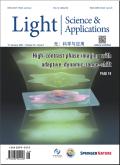Ultra-highly linear Ga2O3-based cascade heterojunctions optoelectronic synapse with thousands of conductance states for neuromorphic visual system.
IF 23.4
Q1 OPTICS
引用次数: 0
Abstract
Ultrawide bandgap semiconductor optoelectronic synapses can perform high-parallel computing with a low false alarm rate, making them ideal for building deep-ultraviolet (DUV) neuromorphic visual system (NVS). However, the rapid carrier recombination in these optoelectronic synapses results in a poor number of conductance states and a low linear weight update protocol, consequently degrading the image recognition accuracy of DUV NVSs. This work proposes a type of cascade heterojunctions capable of finely tuning the dynamics of photogenerated carriers, utilizing aluminum interdigital electrodes sandwiched between tin-doped Ga2O3 and oxygen-deficient hafnium oxide (GTO/Al/HfOx) films. The built-in fields at the GTO/HfOx heterojunction and the Al/HfOx hole Schottky junction interfaces facilitate the separation of photogenerated carriers and the subsequent trapping of holes by the oxygen defects in the HfOx, respectively. The GTO/Al/HfOx optoelectronic synapses exhibit an ultrahigh responsivity of over 104 A/W and a large photo-to-dark current ratio of 6 × 105, which results in exceptional synaptic plasticity with unprecedented 4096 conductance states and excellent linearity with a fitting coefficient of 0.992. These attributes enable the GTO/Al/HfOx optoelectronic synapses to execute logical operations with fault-tolerance capability and to achieve high-accuracy fingerprint classification. The innovative cascade heterojunctions design, along with the elucidated carrier dynamics modulation mechanism, facilitates the development of DUV NVSs.神经形态视觉系统中具有数千个电导状态的超线性ga2o3级联异质结光电突触。
超宽带隙半导体光电突触可以实现高并行计算和低误报率,是构建深紫外(DUV)神经形态视觉系统的理想选择。然而,这些光电突触中的快速载流子重组导致电导状态数量少,线性权重更新协议低,从而降低了DUV NVSs的图像识别精度。这项工作提出了一种能够精细调节光生载流子动力学的级联异质结,利用夹在掺锡Ga2O3和缺氧氧化铪(GTO/Al/HfOx)薄膜之间的铝数字间电极。GTO/HfOx异质结和Al/HfOx空穴Schottky结界面上的内置场分别促进了光生载流子的分离和随后由HfOx中的氧缺陷捕获空穴。GTO/Al/HfOx光电突触具有超过104 A/W的超高响应度和6 × 105的大光暗电流比,具有前所未有的4096电导状态和优良的线性度,拟合系数为0.992。这些特性使GTO/Al/HfOx光电突触能够执行具有容错能力的逻辑操作,并实现高精度指纹分类。创新的级联异质结设计,以及阐明的载流子动力学调制机制,促进了DUV NVSs的发展。
本文章由计算机程序翻译,如有差异,请以英文原文为准。
求助全文
约1分钟内获得全文
求助全文
来源期刊

Light-Science & Applications
数理科学, 物理学I, 光学, 凝聚态物性 II :电子结构、电学、磁学和光学性质, 无机非金属材料, 无机非金属类光电信息与功能材料, 工程与材料, 信息科学, 光学和光电子学, 光学和光电子材料, 非线性光学与量子光学
自引率
0.00%
发文量
803
审稿时长
2.1 months
 求助内容:
求助内容: 应助结果提醒方式:
应助结果提醒方式:


